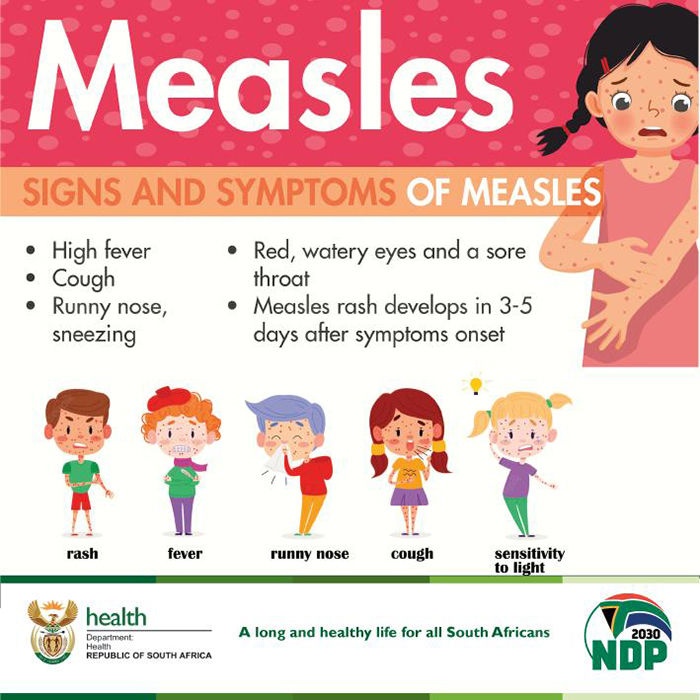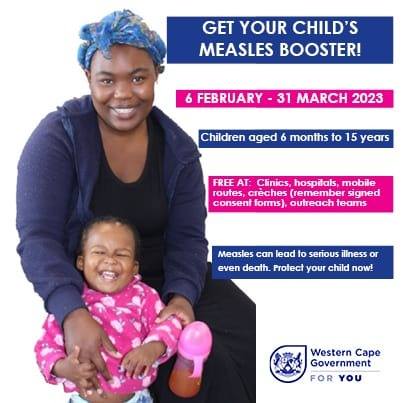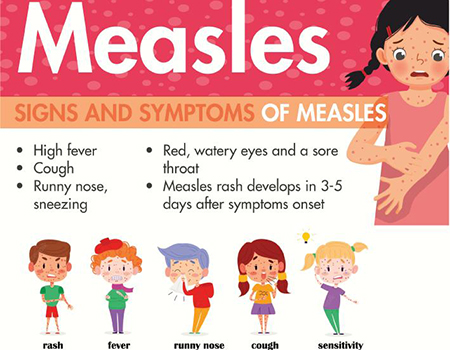As part of nationwide efforts to contain outbreaks of measles, as experienced in several other provinces, the Western Cape Department of Health will be making additional booster doses available for every child under the age of 15 from 6 February until 31 March 2023. These additional measles boosters will ensure healthy and thriving children.
While only five measles positive cases have been reported in the Western Cape to date, these cases are not linked and do not meet the criteria for declaring an outbreak. The Department is, however, encouraging parents and caregivers to take up this life-saving opportunity and support the measles vaccination campaign by ensuring that they keep up with their children’s immunisation schedule and being alert to the symptoms of measles, which is a preventable disease.
Parents of children under 15 who are not in crèches, day-care centres or public schools, are urged to take their child to their closest clinic. For children in crèches, day-care centres or public schools, the department will be visiting them through the integrated school vaccination programme to offer convenient and safe vaccinations. Parents will need to sign an informed consent form, sent by the education facility, giving permission for their child to receive the measles vaccination.
“There are reports of measles outbreaks in the rest of the country, and some parents are worried. Our goal is for all children under 15 in the province to be protected by a measles vaccine. This will enable us to interrupt the spread of measles cases and save lives. We appeal to parents and caregivers to make the wise choice and vaccinate their eligible children against measles. “Let us leave no child behind and ensure they grow up healthy,” says Dr Nomafrench Mbombo, Western Cape Minister of Health and Wellness, who is expected to officially launch the provincial measles booster campaign in the Metro in February 2023 at a site where our school health teams will be administering the booster vaccine to those children whose parents and guardians have returned the signed consent forms.

Despite the availability of a safe and effective vaccine, measles remains one of the leading causes of death among young children. It is particularly dangerous for children, who may develop severe complications (such as pneumonia or brain swelling).. Symptoms usually include fever, cough, red eyes and a rash. Measles is extremely contagious and is one of the most easily spread viruses that infects humans.
“Too many children under 15 years of age have been left without protection against measles and other vaccine preventable diseases, due to the COVID-19 pandemic. This has seen the risk of large outbreaks increasing in the country. Now more than ever, ensuring that children are up to date with their routine immunisations will help limit the risk of measles for them and others. The vaccine provides lifelong protection against measles and is available free of charge at our public health facilities and through our integrated school vaccination programme. The measles-mumps-rubella vaccine (MMR) is also available, at cost, in private sector clinics and is equally effective and safe,” says Sonia Botha, the Western Cape coordinator of the Expanded Programme on Immunisation (EPI).
The Western Cape’s aim is to have 95% of children immunised against measles as this would prevent outbreaks and provide greater immunity for our children against severe disease. To be protected against measles, two doses of the measles vaccine are required. Currently, an average of 80% of children in the province have received two doses of measles.
Signs and symptoms
- The first sign of measles is usually a high fever, which begins about 10 to 12 days after exposure to the virus and lasts between four and seven days.
- Other signs such as a cough, red and watery eyes, runny nose and small white spots inside the cheeks usually develop in the initial stage.
- After several days, a rash erupts, usually on the face and upper neck. The rash looks like small, red, flat spots over the body. The rash does not form blisters, nor is it itchy or painful.
- Over about three days, the rash spreads, eventually reaching the hands and feet. The rash lasts for five to six days, and then fades. On average, the rash occurs 14 days after exposure to the virus (within a range of seven to 18 days).
Who is at risk?
- Unvaccinated young children are at highest risk of measles and its complications, including death.
- Unvaccinated pregnant women are also at risk.
- Any immune compromised person (who has not been vaccinated or was vaccinated but did not develop immunity) can become infected.
Treatment
- No specific antiviral treatment exists for the measles virus.
- Severe complications from measles can be avoided through supportive care which includes good nutrition, adequate fluid intake and treatment of dehydration with an oral rehydration solution to replace fluids and other essential elements that are lost through diarrhoea or vomiting.
- Paracetamol and warm water sponging are recommended for treatment of fever.
- Antibiotics may be prescribed by the healthcare provider to treat eye and ear infections, or pneumonia.
- Prevention
- Routine measles vaccination for children is a key public health strategy to reduce measles deaths.
- The measles vaccine has been in use for over 50 years. It is safe, effective, and inexpensive.



